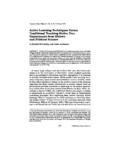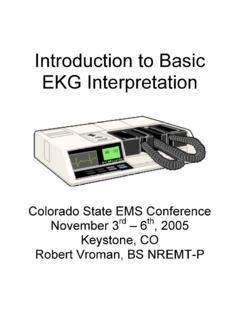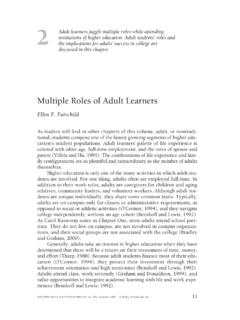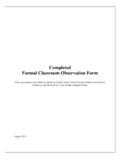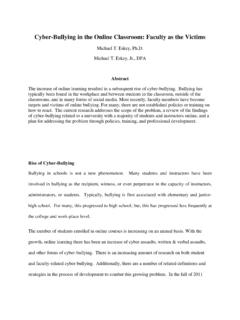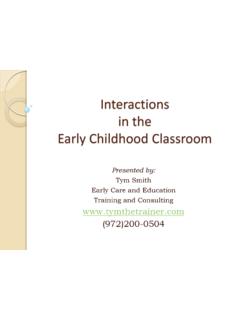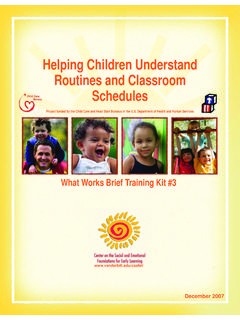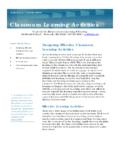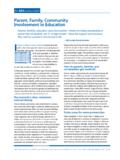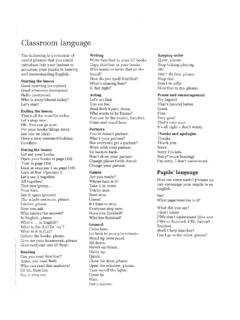Transcription of Adult Learners in the Classroom - Robert Vroman
1 6. Theory and research provide insight into the characteristics, needs, and teaching preferences of Adult Learners in the college Classroom . Adult Learners in the Classroom Jovita M. Ross-Gordon This chapter begins with an examination of Adult learning theories. It fol- lows with a brief overview of selected theories of Adult development, includ- ing traditional theories that emphasize sequential and psychological development and alternative frameworks that are more concerned with the sociocultural context of development. Next I briefly review studies exam- ining adults as Learners in the college Classroom . Finally, suggestions are offered for effectively aiding Adult Learners , whether in a college Classroom or student service program.
2 Frameworks for Understanding Adult Learning Knowledge of Adult learning theory can provide a basis for effective prac- tice. Presented here are several theoretical approaches to Adult learning. Andragogy. One of the most commonly applied frameworks of Adult learning is andragogy, described as the art and science of helping adults learn (Knowles and Associates, 1984). Malcolm Knowles commonly is credited with bringing this term to the attention of American Adult educators dur- ing the late 1960s and 1970s (Merriam, 2001). Knowles first proposed a set of four assumptions about Adult Learners and contrasted this theoretical framework with that of pedagogy, the art and science of teaching chil- dren (Knowles, 1980).
3 Later, he and colleagues added a fifth assumption (Knowles and Associates, 1984). Regarding the concept of the learner. The Adult learner is responsible for mak- ing personal decisions in day-to-day life, in many cases decisions that also affect others. Similarly, adults are assumed to prefer self-direction in determining the goals and outcomes of their learning. NEW DIRECTIONS FOR STUDENT SERVICES, no. 102, Summer 2003 Wiley Periodicals, Inc. 43. 44 MEETING THE SPECIAL NEEDS OF Adult STUDENTS. Regarding the role of the Learners ' experience. adults bring a vast reservoir of experience to the learning situation that should be capitalized on. They also value learning through direct experience.
4 Regarding readiness to learn. adults are presumed to become ready to learn when they experience a need to know or do something to perform more effectively. Orientation to learning. Because adults typically enter a learning situation after they experience a need in their life, they are presumed to bring a task- or problem-centered orientation to learning. This is in contrast to the subject-centered approach associated with traditional, pedagogical approaches to education. Regarding motivation to learn. The andragogical model presumes that although adults will respond to external motivators such as a job promo- tion, the most potent motivators are internal.
5 Knowles described the andragogical process as consisting of elements aimed at establishing a suitable physical and psychological climate for learn- ing (mutual respect, collaborativeness, supportiveness, openness, and fun). and involving Adult Learners in mutual planning (Knowles and Associates, 1984). The learning contract was promoted as a tool for assisting Adult Learners to exercise self-direction through personally identifying goals, resources, implementations, and means of evaluating their learning (Knowles, 1975). Andragogy sustained considerable critique during the 1980s and 1990s; yet, scholars taking a retrospective look note its undeni- able effect on Adult education practice (Pratt, 1993; Merriam, 2001).
6 Self-Directed Learning. Even as self-direction in learning was emerg- ing as one of the most challenged assumptions within andragogy, a distinct body of theory and research on self-directed learning (SDL) was evolving. Allen Tough (1971) generally is credited with providing the first compre- hensive description of SDL and initiating a long-standing body of research on this topic. Although research on self-direction takes many paths, read- ers of this volume may be interested especially in the literature on self- direction as a learner attribute. A significant proportion of the empirical research in this area has focused on a characteristic referred to as SDL readi- ness, most frequently measured with the Self-Directed Learning Readiness Scale (Guglielmino, 1997).
7 Yet, it has been observed that self-directedness may be a situational variable rather than an enduring learner characteristic (Candy, 1991; Pratt, 1988). The research on SDL with the instructional environment suggests that although adults are likely to be interested in exercising some degree of autonomy in learning, faculty and staff who facil- itate Adult learning should expect diversity both among Learners and across situations for the same individual and be prepared to make adjustments in expectations or level of support. Grow's description (1991) of the Staged Self-Directed Learning model offers some guidance in this regard for col- lege instructors.
8 In this model, Grow describes four stages of self-direction Adult Learners IN THE Classroom 45. observed among college students and outlines possible roles for the teacher or facilitator based on each of the learner stages: coach, guide, facilitator, consultant. Transformative Learning. For those who question whether either andragogy or SDL theory represents a learning theory that is uniquely Adult , transformative learning theory, proposed and revised most prominently by Jack Mezirow (2000), offers an appealing alternative. This theory grew out of Mezirow's research with reentry women in higher education. He offers the following definition of transformative learning: Transformative learn- ing refers to the process by which we transform our taken-for-granted frames of reference (meaning perspectives, habits of mind, mind-sets) to make them more inclusive, discriminating, open, emotionally capable of change, and reflective so that they may generate beliefs and opinions that will prove more true or justified to guide action (Mezirow, 2000, pp.)
9 7 8). Hence, Adult Learners who have viewed their college professor as the source of all legitimate knowledge may through transformational learning come to understand that they, too, are capable of constructing knowledge. Kegan (2000) contrasts transformative learning (changes in how we know). with informative learning (changes in what we know), adding that we all experience potentially important changes that do not bring about a funda- mental shift in our frames of reference. Perspective transformation often is described as being triggered by a sig- nificant life event, originally referred to by Mezirow as a disorienting dilemma. Subsequent research, however, has indicated that transformation also can occur in response to events as minor as a lecture that creates an opportunity for reflection and redirection, or it may occur when an accu- mulation of internal dilemmas creates a growing sense of disillusionment (Taylor, 2000).
10 The decision to return to college itself may be associated with transformative learning in one of several ways. It may represent the culmi- nating action phase described as one of the steps in transformative learn- ing (Mezirow, 2000), or it may reflect just one element of what Clark (1993). describes as an integrating circumstance when persons consciously or unconsciously search for something that is missing in their life, or it may act as the primary stimulus for transformative learning. According to Mezirow, Fostering these liberating conditions for making more autonomous and informed choices and developing a sense of self-empowerment is the cardi- nal goal of Adult education (2000, p.)
